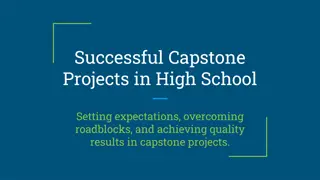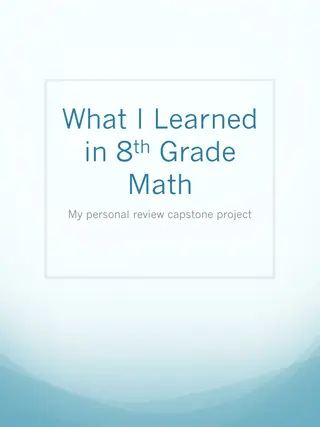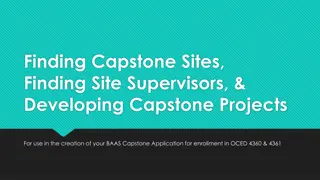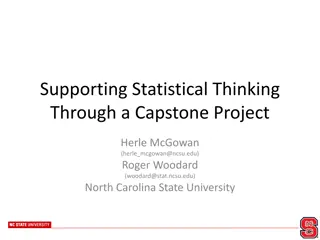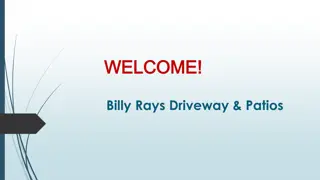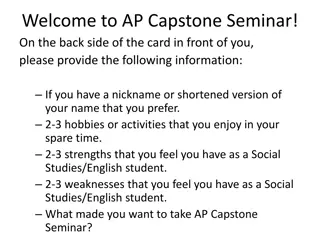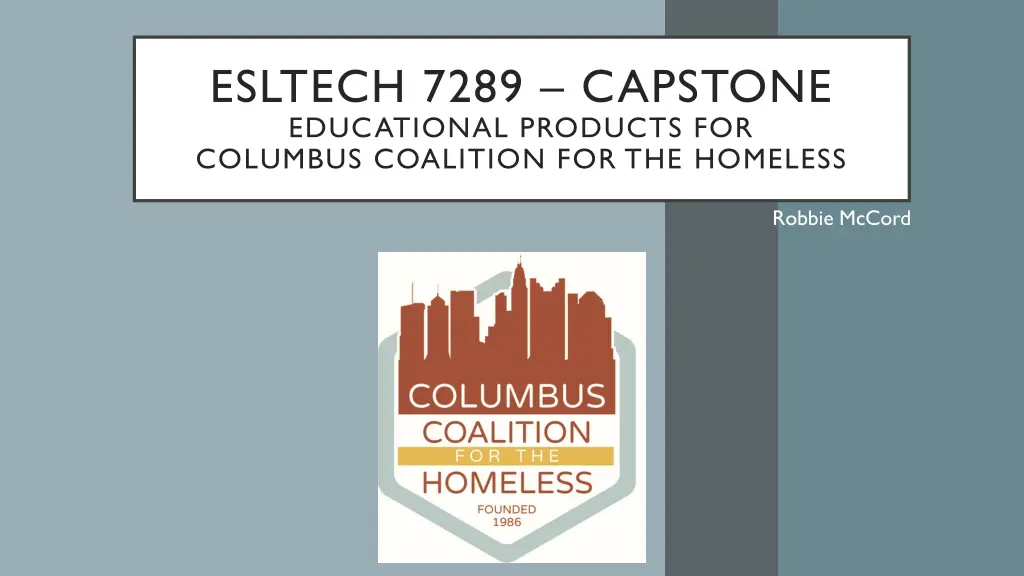
Innovative Educational Approach to Addressing Racism and Homelessness
Explore a project aimed at enhancing community awareness about homelessness and racism through engaging educational products. The initiative involves developing webinars, online modules, and presentations to promote understanding and raise consciousness on these social issues.
Download Presentation

Please find below an Image/Link to download the presentation.
The content on the website is provided AS IS for your information and personal use only. It may not be sold, licensed, or shared on other websites without obtaining consent from the author. If you encounter any issues during the download, it is possible that the publisher has removed the file from their server.
You are allowed to download the files provided on this website for personal or commercial use, subject to the condition that they are used lawfully. All files are the property of their respective owners.
The content on the website is provided AS IS for your information and personal use only. It may not be sold, licensed, or shared on other websites without obtaining consent from the author.
E N D
Presentation Transcript
ESLTECH 7289 CAPSTONE EDUCATIONAL PRODUCTS FOR COLUMBUS COALITION FOR THE HOMELESS Robbie McCord
The ask CCH has as one of its stated goals to educate the community about homelessness. However, Director acknowledged that previous educational experiences (Homelessness and the Housing Crisis) have been less engaging than he would like. Director wanted to do something on Racism and Homelessness that was more engaging.
Information gathering Viewed previous webinar Informative Not very engaging Looked at journal articles Engaging Meaningful
Deliverables Systemic Racism and Homelessness Presentation PPT Would be delivered to large audience via webinar format Homelessness and the Housing Crisis online module Cut up original video Place in online LMS with additional content
Timeline 1/27/21 Present project outline to partners at CCH 2/21/21 Submit MOU to advisor 3/12/21 Complete first draft of Racism and Homelessness webinar 3/12/21 Complete Homelessness and Housing Crisis module (ready in LMS) 3/26/21 Complete final draft of Racism and Homelessness webinar 3/26 4/9 Work to ensure products meet accessibility standards 4/9/21 Present work to Advisor and 2nd reader 4/15/21 Turnover to CCH
Process Development Process Process for Homelessness and Housing Crisis Cut up video using Premiere Pro Insert into TalentLMS Supplemental material
Process Development Process Process for Systemic Racism and Homelessness Weekly meetings with Director and SME Inserted pieces into PPT, review cycle Nearing end, presenters participated in review
RACISM AND HOMELESSNESS
Overview Brief Modern day examples of racism, and how this impacts homelessness How to Get Involved History of Racism in America Hopeful signs Conclu sion Intro
Introduction More than 70 percent of people experiencing homelessness in Columbus are African-American. African-Americans only make up 24 percent of Columbus and Franklin County. Racism (especially systemic racism) provides an explanation for this disparity in numbers. Urgent: Consider that the average life expectancy of a person experiencing homelessness is 50 years (almost 20 years lower than people with homes!).
Brief History of Racism in America
BLACK CODES/JIM CROW Following Emancipation Proclamation, Southern white landowners tried to maintain control using criminal justice system Black Codes Black Codes Yearly labor contracts Breaking contracts Arrest Black Codes led to incarceration of unprecedented amount of African- Americans Jim Crow laws arose in place of Black Codes How might we still be seeing these effects on the justice system today? What might be the impact on homelessness?
SEGREGATED HOUSING Plantation housing Abolishment of slavery segregated housing becomes institutional Lenders make it virtually impossible for African-Americans to get mortgages in certain neighborhoods (redlining) Minorities concentrated in underfunded areas Still difficult for these houses to appreciate in value (little wealth generation) How might we still be seeing these effects on housing and wealth today? What might be the impact on homelessness?
DISCRIMINATORY EMPLOYMENT PRACTICES Forced labor on plantations After slavery, continue to work on lands of white landowners African-Americans were restricted from many New Deal programs Discriminatory hiring practices right up to today Many African-Americans have been concentrated in least desired and lowest paying jobs How might we still be seeing the effects of low wages and other discriminatory employment practices today? What might be the impact on homelessness?
AUDIENCE POLL QUESTION Poll question Have you or someone you know been impacted by systemic racism? No Maybe; I m not sure Yes Discussion One or two people share examples of situations they ve witnessed involving systemic racism.
Systemic Racism Home ownership and housing Education, employment, income Criminal Justice Homelessness
RACISM AND HOME OWNERSHIP/HOUSING Home ownership allows for the building up of family wealth Unfortunately, many African-Americans do not have this resource In 2020, 44 percent of Black families owned a home; 73 percent of white families Even starker in some cities (e.g. Minneapolis: 25 percent of Black families; 76 percent white families) Gap in homeownership is larger today than in 1930s Even when Black families own their home, their property taxes are significantly higher
RACISM AND HOME OWNERSHIP/HOUSING Why a homeownership gap? Lingering effects of discriminatory housing policies Redlining: assigned grade levels and codes to neighborhoods that represented lenders perceived credit risk risk was often determined by residents race End result: Virtually impossible to qualify for mortgage in red-lined neighborhood Today, many Black families own homes in formerly-red- lined neighborhoods that have much lower property values lower accumulation of wealth
Systemic Racism Home ownership and housing Education, employment, income Criminal Justice Homelessness
RACISM AND JOBS, EDUCATION, INCOME In general, African-Americans face more barriers to getting and keeping good jobs than whites Jobs that are: lower paying have worse benefits less stable (when economy turns downward, these are first to go) Result of fewer opportunities, due to: Lack of college education Systemic racism Outright employment discrimination
Systemic Racism Home ownership and housing Education, employment, income Criminal Justice Homelessness
RACISM AND CRIMINAL JUSTICE African-Americans make up 13 percent of the US population, yet are drastically overrepresented in numbers of arrests and incarcerations: Policing and profiling 2020 NY Times investigation: In Minneapolis African-Americans are 19 percent of population; 58 percent of police use-of-force incidents Sentencing Survey sampling Louisiana inmates found those serving life without parole for nonviolent offenses were 91 percent Black, despite being only 33 percent of state population
INCARCERATION AND HOMELESSNESS People with conviction histories are more likely to experience homelessness In fact, those with one or more convictions are 13 times more likely to experience homelessness According to HUD, more than 50,000 people per year go directly from correctional facility to shelter Those experiencing unsheltered homelessness are far more likely to interact with police and justice system
JANE ELLIOT VIDEO CLIP Jane Elliot asks white people a profound question https://www.youtube.com/watch?v=YTOierm0P4Y Self Reflection: How can you change the narrative?
HOPEFUL SIGNS FOR CHANGE Black Lives Matter Movement and Police Reform Justice System Changes special dockets, cash bail, decriminalization, of drugs, etc. Monuments, Flags, and Symbols of the Confederacy Recognition of Racism in Film and Media
Reflections Heavy lifting came at beginning of project Last few weeks have also provided a challenge Team has worked great together Great feedback from Director Helps that everyone believes fervently in cause



